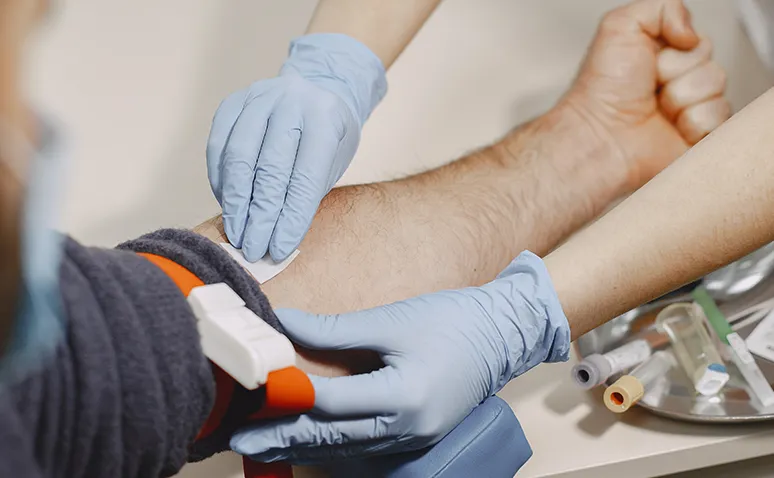What is Endocrinology? Endocrinology refers to the system responsible for regulating the body’s hormonal balance and coordinating the functions of various organs. This system produces chemical messengers known as hormones, which are transported to target cells through the bloodstream. Hormones play a crucial role in controlling numerous biological processes, including growth, metabolism, and reproduction, helping the body maintain homeostasis.
What is Endocrinology? The primary function of the endocrine system, also known as the internal secretion system, is to regulate hormones that ensure long-term balance within the body. The organs of this system release specific hormones as needed, which are carried to target tissues via the bloodstream. For instance, the thyroid hormones accelerate metabolism, while the pancreas secretes insulin to regulate blood sugar levels. This coordination allows the body to adapt to environmental changes and internal stress factors. The proper functioning of this system is essential for maintaining overall health.
Components of the Endocrine System:
• Pituitary Gland: Located at the base of the brain, this gland is known as the master gland as it controls the activities of other endocrine glands.
• Thyroid Gland: Situated at the front of the neck, it secretes hormones that regulate metabolism.
• Parathyroid Glands: These are four small glands located behind the thyroid gland; they help maintain calcium balance.
• Adrenal Glands: Positioned above the kidneys, they secrete hormones like cortisol, which regulate the stress response.
• Pancreas: Produces insulin and glucagon, hormones that regulate blood sugar levels.
• Epinephrine (Adrenal Glands): Also known as adrenaline, it is secreted in response to stress and activates the “fight or flight” response.
• Gonads (Testes and Ovaries): Produce reproductive hormones; the testes secrete testosterone, while the ovaries produce estrogen and progesterone.
• Pineal Gland: Found in the brain, it secretes melatonin, a hormone that influences sleep cycles.
What is the Endocrine System?
The endocrine system consists of internal glands that secrete hormones, which reach target cells through the bloodstream. This system functions to coordinate between organs and maintain balance within the body.
Endocrine system disorders arise when the body’s hormonal balance is disrupted, leading to various health problems. A deficiency or excess in hormone production can make it difficult for the body to maintain homeostasis. For instance, thyroid disorders such as hypothyroidism or hyperthyroidism are hormonal imbalances that directly affect metabolic rate.
These conditions often result from dysfunction in the organs responsible for hormone production. A problem in the pituitary gland, for example, can cause growth hormone deficiency or overproduction.
The healthy functioning of the endocrine system is crucial, particularly concerning metabolic diseases. Metabolism refers to the processes of energy production, utilization, and storage in the body. Thyroid hormones play a direct role in regulating the metabolic rate. Any disruption in the endocrine system can negatively impact metabolism. Diseases like diabetes, which are linked to

impaired insulin production by the pancreas, disrupt metabolic balance and elevate blood sugar levels.
Hormones are the fundamental components of the endocrine system, serving diverse functions within the body. Each hormone has a unique role, and imbalances in their levels can lead to various diseases. For example, cortisol is essential for the stress response, but elevated levels can harm the body. Similarly, reproductive hormones such as estrogen and testosterone regulate reproductive health and sexual development. The balanced secretion of hormones is vital for the body’s optimal functioning.
What Does the Endocrinology Department Do?
The endocrinology department is a medical specialty that focuses on maintaining the body’s hormonal balance and studying hormones secreted by internal glands. This department diagnoses and treats diseases related to the endocrine system.
The endocrine system consists of hormone-producing glands such as the thyroid, parathyroid, pituitary, adrenal glands, pancreas, and reproductive organs. The hormones secreted by these organs regulate essential body functions such as growth, metabolism, reproduction, and the stress response. The endocrinology department investigates the underlying causes of issues resulting from hormonal imbalances.
Common conditions managed by the endocrinology department include diabetes, thyroid disorders (hypothyroidism and hyperthyroidism), growth and developmental disorders, polycystic ovary syndrome (PCOS), adrenal gland disorders, and metabolic disorders. Diabetes, for instance, involves issues with the pancreas’s insulin production, affecting blood sugar regulation. Thyroid disorders directly influence metabolic rate, impacting weight, energy levels, and mood.
The department uses diagnostic tools such as blood tests, imaging techniques, and biopsies to identify hormonal imbalances. Once a deficiency or excess in hormone levels is detected, a tailored treatment plan is devised. Common treatment methods include hormone therapy, lifestyle changes, and, when necessary, surgical interventions. The endocrinology department adopts a holistic approach to restore hormonal balance and improve patients’ overall health.

What is Endocrine Treatment?
Since hormones regulate many fundamental functions in the body, endocrine treatment involves a range of methods aimed at correcting hormonal imbalances. This treatment may address hormone deficiencies or excessive hormone production. For example, insulin therapy is used for diabetes management, while thyroid hormone replacement is prescribed for hypothyroidism. Treatment plans are customized based on the patient’s condition and hormone levels.
What is an Endocrine Examination?
An endocrine examination evaluates the hormonal balance within the body. The physician begins by listening to the patient’s symptoms and obtaining a detailed medical history. Blood and urine tests are then performed to measure hormone levels. Thyroid hormones, in particular, are critical indicators of metabolic and energy balance. If necessary, imaging techniques such as ultrasound, MRI, or biopsy are used to assess the structural state of the glands. Following the examination, a diagnosis is made, and an appropriate treatment process is initiated.Formun ÜstüFormun Altı










